Analysis: The Highlanders are the masters of chaos

Not much has changed with the Highlanders following the appointment of Aaron Mauger as their new head coach – they still play the same way, and are still finding success.
The side has compiled a 3-1 record and look firmly in contention for the New Zealand conference despite losing to the Hurricanes last weekend.
Their methods revolve around creating as many destabilised situations as possible, putting the defence in scramble mode with the most diverse attacking kicking game in the competition.
The new midfield pairing of Teihorangi Walden and Rob Thompson has the Highlanders kicking game on steroids – another two legitimate kicking options which they use as unexpected changeups to Smith and Sopoaga. It doesn’t matter where the Highlanders are on the field, they have a play in every situation revolved around putting boot to ball.
Surprisingly though, they kick 20% less than the top kicking side – the Rebels. They come in at number five of sides that kick the most. It’s not the volume of kicking, it’s how they are kicking that is has become renown with the Highlanders style of play.
Smith’s box kicking
It’s uncanny how many of Aaron Smith’s box kicks result in Highlanders regaining possession – either through the contest or by opposition error. The clinical halfback drops the ball on a pinpoint despite flirting with the touchline and rarely is the hoist non-contestable.
The Highlanders will clear their lines if they are deep inside their 22, but if not, they will work into a position on the 15m tramlines for a Smith box kick.
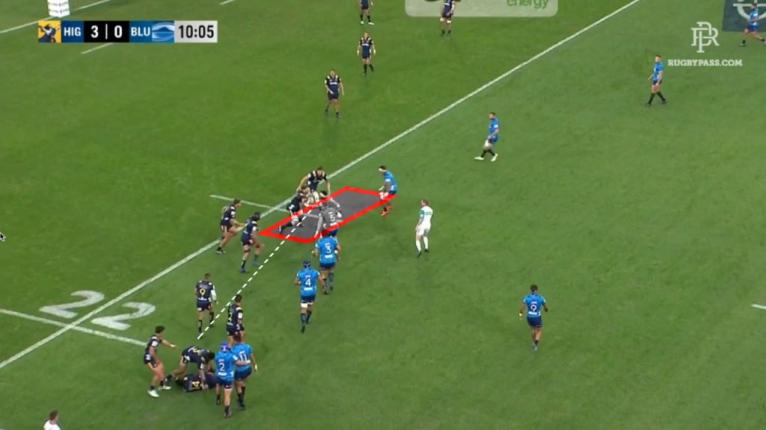

The box kick puts up contestable possession in the middle third of the field, which at the very least still releases pressure but enables the Highlanders to potentially regain possession.
The kick-chase work of the Highlanders back three is integral to this tactic, and with aerial specialists like Ben Smith, it is not a low percentage play. They provide the pressure and often will force an opposition error.
The Landers Playground
The middle third of the field is where the Highlanders kicking game diversifies. They will utilise every type of short-to-mid range kick in this zone – chips, grubbers and bombs to keep the game in a constant state of flux.
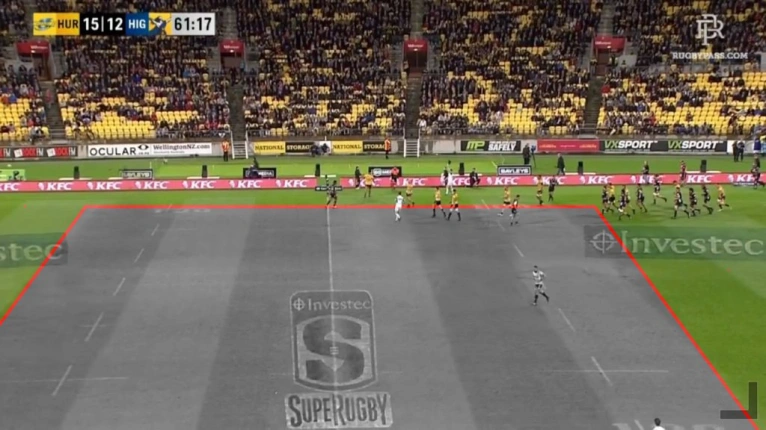
They may play two or three phases before using one of three short kicking options – Lima Sopoaga, Teihorangi Walden or Rob Thompson, to test the cover defence by putting the ball back in the air or on the ground.
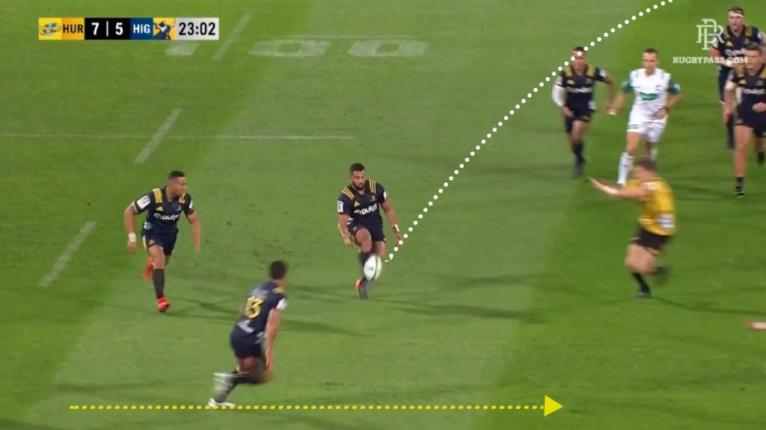
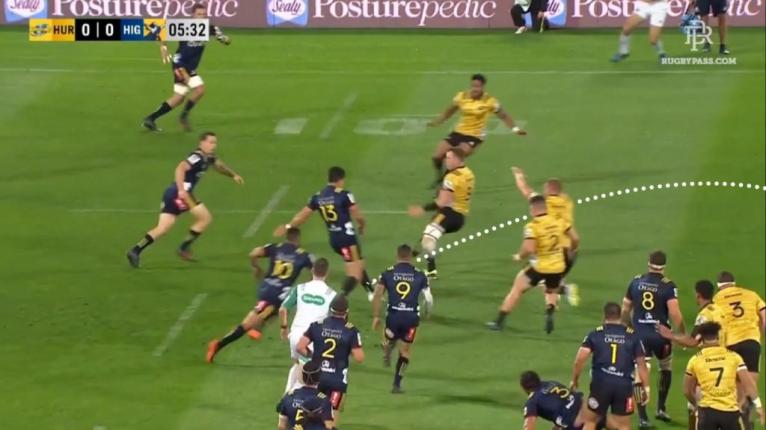
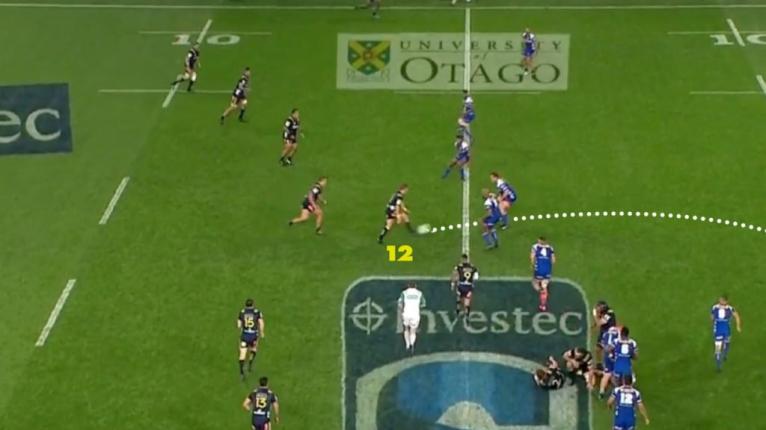
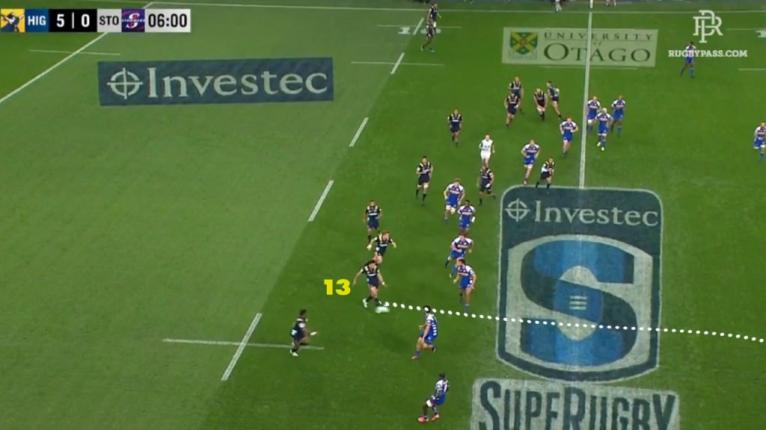
The fact the Highlanders have up to five legitimate kicking options (Aaron Smith, Sopoaga, Walden, Thompson and even Ben Smith) keeps the opposition guessing where the kick will come from. Using centre Rob Thompson, in particular, entices the wingers to come up to the line opening up space in behind.
The opposition is constantly scrambling backward and the back three are put under the spotlight to cover and clean up the loose ball frequently.
First phase kicking
In addition to a jester’s box of general phase kicking, the Highlanders kick the most of any team directly from set piece outside of their own 22.
Most of their set-piece plays are variations of this formation, which allows them to disguise certain kicks.

Their base formation starts with a flat midfield. With Smith’s mastery of precise long passing, they use a flat skip pass to the second receiver to take a hit up and Lima Sopoaga wraps around as a backdoor option.

Here is the same play with a slight variation with Walden (12) and Thompson (13) switching roles.
This basic crash play is used in a number of situations such as their two-phase exit – Walden or Thompson will set up the ruck from which Smith will clear from the base into touch.

It is also used as the foundation of their attack in other areas of the field.
As the four players involved in this formation are all legitimate kicking options, the Highlanders can run a number of variations of the play with attacking kicks built in.
Walden and Thompson usually run hard straight lines in this formation but when they become kick chasers the defence isn’t immediately aware of what’s happening.

Smith runs off the back of the lineout maul and Walden and Thompson run their normal lines. Smith opts to chip the ball over off his left foot while the midfielders at full pace glide through with ease in pursuit of the kick.

A fortuitous bounce allows Michael Collins to clean up a dangerous situation.

Later in the match, we see the same formation from a scrum, this time with fullback Ben Smith also on a sweep line and with Thompson and Walden switching positions again.

The Blues are catfished when Thompson puts in an unexpected chip kick over the top. Pulu is unable to secure the bouncing ball for the Blues and it sits up perfectly for Walden who scores a crucial try for the Highlanders.

The Highlanders also run a number of two-phase strikes from this formation when Walden or Thompson are simply used as crash runners. The Highlanders will set up in the middle before using Smith’s ruck speed to run a switch play. Using such a variety of plays from the same look helps keep the opposition guessing.
This has become the foundation on which the Highlanders are building their set-piece attack from and allows them to incorporate many of their kicking principles – get the ball in the air or on the ground as much as they can. They have only scratched the surface with the number of ways they can attack from this formation. Expect the Highlanders to integrate the Sopoaga back-door option as the season goes on, which brings into play his cross-field kicking.
The constant peppering of short kicks and guessing game the Highlanders play creates chaos under which the men from the deep south thrive. The Chiefs back three will have to be on their game as head coach Aaron Mauger alluded to not being happy with where the game was played against the Hurricanes – only 39% territory in the opposition half.
Expect a barrage of toe action on Friday night.




























